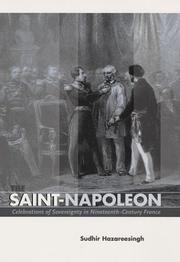| Listing 1 - 2 of 2 |
Sort by
|

ISBN: 0674038444 9780674038448 0674013417 9780674013414 Year: 2022 Publisher: Cambridge, MA
Abstract | Keywords | Export | Availability | Bookmark
 Loading...
Loading...Choose an application
- Reference Manager
- EndNote
- RefWorks (Direct export to RefWorks)
In 1852, President Louis Napoleon of France declared that August 15--Napoleon Bonaparte's birthday--would be celebrated as France's national day. Leading up to the creation of the Second Empire, this was the first in a series of attempts to "Bonapartize" his regime and strengthen its popular legitimacy. Across France, public institutions sought to draw local citizens together to celebrate civic ideals of unity, order, and patriotism. But the new sense of French togetherness was fraught with tensions. Drawing on a wealth of archival evidence, Sudhir Hazareesingh vividly reconstructs the symbolic richness and political complexity of the Saint-Napoleon festivities in a work that opens up broader questions about the nature of the French state, unity and lines of fracture in society, changing boundaries between public and private spheres, and the role of myth and memory in constructing nationhood. The state's Bonapartist identity was at times vigorously contested by local social, political, and religious groups. In various regions, people used the national day to celebrate their own communities and to honor their hometown veterans; but elsewhere, the revival of republican sentiment clashed sharply with imperial attitudes. Sophisticated and gracefully written, this book offers rich insights into modern French history and culture.
Political culture --- Political customs and rites --- Bonapartism --- Festivals --- Symbolism in politics --- Symbolic politics --- Political science --- Imperialism --- Customs and rites, Political --- Political rituals --- Rituals, Political --- Manners and customs --- Political anthropology --- Rites and ceremonies --- Culture --- History --- Napoleon --- Bonapart, Napoleon, --- Bonāpārṭa, Nepoliyana, --- Bonaparte, Napoleão, --- Bonaparte, Napoleon, --- Bonaparte, Napoleone, --- Bonaparṭeh, Napolyon, --- Buonaparte, Napoleon, --- Na-pʻo-lun, --- Nābuliyūn, --- Napoleone --- Napʻolleong, --- Napolun, --- נפוליאון --- נפוליאון, --- نابليون --- بونابرت، نابليون، --- Būnābart, Nābuliyūn, --- Influence. --- Monuments. --- France --- Napoléon --- Bonaparte, Napoléon --- Bonāpārṭa, Nepoliyana --- Bonaparte, Napoleão --- Bonaparte, Napoleon --- Bonaparte, Napoleone --- Buonaparte, Napoleon --- Na-pʻo-lun --- Napolun
Book
ISBN: 9782706723230 2706723238 2706723238 9782706723230 Year: 2022 Publisher: Paris Salvator
Abstract | Keywords | Export | Availability | Bookmark
 Loading...
Loading...Choose an application
- Reference Manager
- EndNote
- RefWorks (Direct export to RefWorks)
Un conflit entre Dieu et César, au début du xixe siècle ? Comment et pourquoi le pape Pie VII (1742-1823) a-t-il été emprisonné par Napoléon, entre 1809 et 1814 ? Si le fait est assez connu, l'arrestation, la détention à Savone, puis à Fontainebleau, et les transferts « secrets » méritent d'être racontés. L'auteur de ce livre les relate de manière très vivante en s'appuyant sur les rapports des « geôliers » du pontife, le préfet Chabrol et surtout le capitaine Lagorsse, dont les écrits savoureux sont conservés aux Archives nationales. À travers des péripéties souvent douloureuses et parfois pittoresques, Pie VII apparaît comme une forte personnalité qui accepte les contraintes mais fait preuve aussi d'une extraordinaire puissance de résistance. Sa bienveillance se vérifie dans les rapports qu'il entretient avec ses geôliers et avec l'empereur - au point de se faire parfois berner. Mais plus largement, l'événement illustre le choc de deux personnalités très contrastées, Napoléon et Pie VII, ainsi que l'opposition entre autorité spirituelle et pouvoir impérial. Un épisode majeur, bien que méconnu, de l'histoire complexe des relations entretenues, en France, entre l'Église et l'État, conté avec beaucoup de talent par Serge Ceruti. AUTEUR Serge Ceruti est agrégé d'histoire et géographie. Après une carrière dans l'enseignement, il se passionne pour l'histoire du Premier Empire. Il collabore à la Revue d'histoire de Fontainebleau.
Pie VII, pape, 1742-1823 --- Napoléon Ier, empereur des Français, 1769-1821 --- Church and state --- History --- Pius --- Napoleon --- Napoléon --- Bonaparte, Napoléon --- Bonapart, Napoleon, --- Bonāpārṭa, Nepoliyana --- Bonaparte, Napoleão --- Bonaparte, Napoleon --- Bonaparte, Napoleone --- Bonaparṭeh, Napolyon, --- Buonaparte, Napoleon --- Na-pʻo-lun --- Nābuliyūn, --- Napoleone --- Napʻolleong, --- Napolun --- נפוליאון --- נפוליאון, --- نابليون --- بونابرت، نابليون، --- Būnābart, Nābuliyūn, --- Pie --- Chiaramonti, Barnaba, --- Chiaramonti, Gregorio, --- Pío --- Captivity. --- Relations with popes. --- Christianity and state --- Separation of church and state --- State and church --- State, The --- 262.13 PIUS VII --- 262.13 PIUS VII Pausschap. Heilige Stoel. Vaticaan. Paus als soeverein--PIUS VII --- Pausschap. Heilige Stoel. Vaticaan. Paus als soeverein--PIUS VII
| Listing 1 - 2 of 2 |
Sort by
|

 Search
Search Feedback
Feedback About UniCat
About UniCat  Help
Help News
News